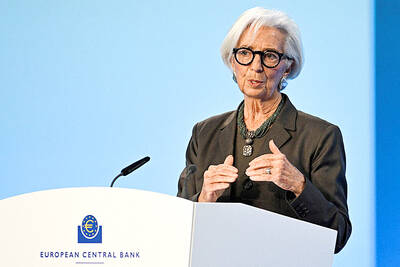With odd-lot intraday trading scheduled to start on Monday next week, the Taiwan Stock Exchange (TWSE) urged investors to be cautious and not to confuse it with regular trading.
Odd-lot trading means that investors can purchase any number of shares between 1 and 999, lower than the standard unit of trading, or 1,000 shares, thus lowering the threshold at which investors can buy high-priced stocks.
The TWSE has asked securities brokerages to provide new online trading platforms that are exclusively for odd-lot intraday trading to differentiate it from current platforms for regular stock trading, TWSE trading division director Ben Chen (陳正斌) told the Taipei Times by telephone.
“Investors need to be careful about which platform they are using when placing orders,” Chen said.
“If you plan to purchase two shares of Largan Precision Co (大立光), that would cost you NT$6,170 [US$213] based on the stock’s closing price of NT$3,085 today,” Chen said. “However, if you mistakenly placed the order through the platform for regular trading and end up buying two units, you would have to pay NT$6.17 million if the order is matched.”
As most brokerages allow investors to buy stocks on margin, they usually set limits on how much money investors could borrow, and if an investor’s credit limit is lower than the amount of an accidental buy order, the order would be canceled automatically, Chen said.
“That would be the lucky case. If your credit limit is higher than the amount of your misplaced order, the order would take effect and be matched. You might suffer huge losses if the stock goes down,” Chen said.
The exchange has asked securities companies to show the total amount of order twice at their trading platforms for investors to double check, but investors still need to be cautious, he said.
Individual odd-lot traders will have to place their orders on online platforms themselves, and not by asking a broker to fill their orders over the telephone, as brokerages are also worried about employees making a mistake when filling orders, Chen said.
While the TWSE has adopted a continuous trading mechanism for its regular stock trading, it would adopt a call auction mechanism for the odd-lot intraday trading, in a bid to help investors differentiate the two platforms, it said.
Orders can be placed from 9am to 1:30pm, with the first match starting at 9:10am, after which orders would be matched every three minutes by call auction, with trades being executed according to the principles of price and time priority, it said.
Unexecuted orders will not be carried forward to after-hours trading.
The existing after-hours odd-lot trading will remain unchanged, with trading from 1:40pm to 2:30pm and matching orders taking place only once at 2:30pm, it said.

European Central Bank (ECB) President Christine Lagarde is expected to step down from her role before her eight-year term ends in October next year, the Financial Times reported. Lagarde wants to leave before the French presidential election in April next year, which would allow French President Emmanuel Macron and German Chancellor Friedrich Merz to find her replacement together, the report said, citing an unidentified person familiar with her thoughts on the matter. It is not clear yet when she might exit, the report said. “President Lagarde is totally focused on her mission and has not taken any decision regarding the end of

French President Emmanuel Macron told a global artificial intelligence (AI) summit in India yesterday he was determined to ensure safe oversight of the fast-evolving technology. The EU has led the way for global regulation with its Artificial Intelligence Act, which was adopted in 2024 and is coming into force in phases. “We are determined to continue to shape the rules of the game... with our allies such as India,” Macron said in New Delhi. “Europe is not blindly focused on regulation — Europe is a space for innovation and investment, but it is a safe space.” The AI Impact Summit is the fourth

CONFUSION: Taiwan, Japan and other big exporters are cautiously monitoring the situation, while analysts said more Trump responses ate likely after his loss in court US trading partners in Asia started weighing fresh uncertainties yesterday after President Donald Trump vowed to impose a new tariff on imports, hours after the Supreme Court struck down many of the sweeping levies he used to launch a global trade war. The court’s ruling invalidated a number of tariffs that the Trump administration had imposed on Asian export powerhouses from China and South Korea to Japan and Taiwan, the world’s largest chip maker and a key player in tech supply chains. Within hours, Trump said he would impose a new 10 percent duty on US imports from all countries starting on

STRATEGIC ALLIANCE: The initiative is aimed at protecting semiconductor supply chain resilience to reduce dependence on China-dominated manufacturing hubs India yesterday joined a US-led initiative to strengthen technology cooperation among strategic allies in a move that underscores the nations’ warming ties after a brief strain over New Delhi’s unabated purchase of discounted Russian oil. The decision aligns India closely with Washington’s efforts to build secure supply chains for semiconductors, advanced manufacturing and critical technologies at a time when geopolitical competition with China is intensifying. It also signals a reset in relations following friction over energy trade and tariffs. Nations that have joined the Pax Silica framework include Japan, South Korea, the UK and Israel. “Pax Silica will be a group of nations